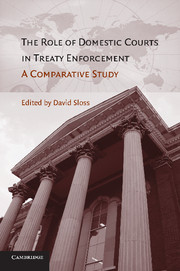Book contents
- Frontmatter
- Contents
- Contributors
- Preface
- Acknowledgments
- 1 Treaty Enforcement in Domestic Courts: A Comparative Analysis
- 2 Does International Law Obligate States to Open Their National Courts to Persons for the Invocation of Treaty Norms That Protect or Benefit Persons?
- 3 Australia
- 4 Canada
- 5 Germany
- 6 India
- 7 Israel
- 8 The Netherlands
- 9 Poland
- 10 Russian Federation
- 11 South Africa
- 12 United Kingdom
- 13 United States
- 14 The Role of Domestic Courts in Treaty Enforcement: Summary and Conclusions
- Index
- References
13 - United States
Published online by Cambridge University Press: 06 January 2010
- Frontmatter
- Contents
- Contributors
- Preface
- Acknowledgments
- 1 Treaty Enforcement in Domestic Courts: A Comparative Analysis
- 2 Does International Law Obligate States to Open Their National Courts to Persons for the Invocation of Treaty Norms That Protect or Benefit Persons?
- 3 Australia
- 4 Canada
- 5 Germany
- 6 India
- 7 Israel
- 8 The Netherlands
- 9 Poland
- 10 Russian Federation
- 11 South Africa
- 12 United Kingdom
- 13 United States
- 14 The Role of Domestic Courts in Treaty Enforcement: Summary and Conclusions
- Index
- References
Summary
INTRODUCTION
This chapter analyzes the practice of U.S. courts in “treaty cases.” The term “treaty cases” includes cases where a court engaged in substantive analysis of a treaty provision, as well as other cases where a party involved in litigation invoked a treaty in support of a claim or defense.
Analysis of judicial decision making in treaty cases is problematic because U.S. courts apply two mutually inconsistent models, which the author has labeled the “nationalist” and “transnationalist” models. The two models provide very different answers to three questions: (1) Which treaties have the force of law in the domestic legal system? (2) How should courts interpret treaties? and (3) Under what circumstances are individuals entitled to judicial remedies for treaty violations? In brief, transnationalists hold that treaties generally have the force of law in the United States, that courts should interpret a treaty in accordance with the internationally agreed understanding of its terms, and that individuals are ordinarily entitled to judicial remedies for violations of their treaty-based individual rights. In contrast, nationalists hold that only self-executing treaties have the force of law, that courts should interpret treaties in accordance with the shared understanding of the U.S. political branches, and that there is a background presumption that treaties do not create judicially enforceable individual rights.
An analysis of judicial doctrine related to treaties, without more, would present an incomplete picture of judicial practice because current doctrine provides support for both the nationalist and the transnationalist approaches.
- Type
- Chapter
- Information
- The Role of Domestic Courts in Treaty EnforcementA Comparative Study, pp. 504 - 554Publisher: Cambridge University PressPrint publication year: 2009
References
- 2
- Cited by



